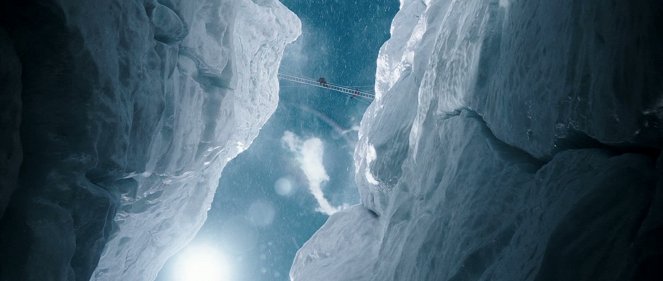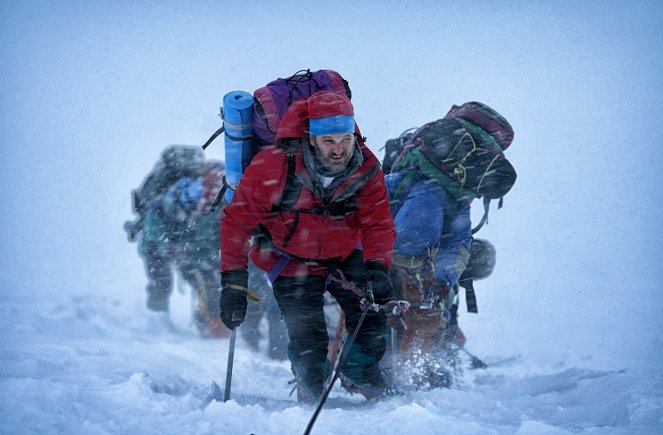Réalisation:
Baltasar KormákurPhotographie:
Salvatore TotinoMusique:
Dario MarianelliActeurs·trices:
Jason Clarke, Jake Gyllenhaal, Josh Brolin, John Hawkes, Sam Worthington, Robin Wright, Michael Kelly, Keira Knightley, Emily Watson (plus)VOD (4)
Résumés(1)
Inspiré d'une désastreuse tentative d'ascension de la plus haute montagne du monde, Everest suit deux expéditions distinctes confrontées aux plus violentes tempêtes de neige que l'homme ait connues. Luttant contre l'extrême sévérité des éléments, le courage des grimpeurs est mis à l'épreuve par des obstacles toujours plus difficiles à surmonter alors que leur rêve de toute une vie se transforme en un combat acharné pour leur salut. (Universal International FR)
(plus)Vidéo (30)
Critiques (18)
Chaque personne envers qui vous développez de la sympathie se retrouvera dans de gros ennuis. C'est la seule ambition scénaristique de l'Everest. Un produit marketing IMAX qui utilise à peine la moitié de l'écran IMAX avec son format grand angle. Un scénario moyennement ordinaire sans aucun dialogue, moment ou personnage mémorable. Le excellent casting international n'a pratiquement rien à jouer, et le personnage de Gyllenhaal, celui auquel nous nous attendions le plus, obtient trois fois plus d'espace que dans les bandes-annonces. La visualisation est belle, l'environnement de l'Everest est authentique. Des plans captivants d'ascension exposée en contrebas de l'échelle d'Hillary. L'arme clé du film est l'intensité de la tempête qui vous assomme dans votre siège dans un cinéma bien équipé en son (Dolby Atmos positif). Le film mérite d'être salué pour ne pas déformer la réalité, ne pas chercher le pathétisme et ne pas se ridiculiser par sa propre stupidité (Limite verticale). Mais tout cela peut aussi être revendiqué par Nordwand, qui n'a pas l'odeur d'une commande de studio bâclée et contrairement à cela, décrit avec enthousiasme narratif et intérêt pour les personnages une ascension historiquement plus importante et dramatiquement plus intense de l'Eiger suisse (qui est totalement différent en termes de difficulté de l'alpinisme par rapport à la "promenade" sur l'Everest).
()
Kormákur a décidé de tourner son film, le plus ambitieux à ce jour, de la manière la plus réaliste possible, sans les artifices traditionnels d'Hollywood et les conflits dramatiques artificiellement déclenchés, faisant d'Everest une reconstitution quasi documentaire des événements réels qui l'ont inspiré. Cependant, il souffre d'un trop grand nombre de personnages - au moins deux douzaines atteignent le sommet et beaucoup d'autres attendent en bas ou à la maison. Ils sont si nombreux que beaucoup d'entre eux n'apparaissent que marginalement dans le film et n'ont pas suffisamment d'espace pour créer un lien émotionnel avec eux, ce qui est assez dommage compte tenu du casting étoilé. Cependant, c'est techniquement bien réalisé, mais sans inventivité ni idée. En tant que témoignage fataliste sur le dépassement de soi, sur la force de l'esprit humain et sur le fait que la nature ait toujours le dernier mot, Everest fonctionne. Cependant, il représente également un film sans risque pour le public, dans lequel l'effort sympathique de crédibilité et de réalisme est compensé par un manque de dramatisme et une surpopulation.
()
A precise survival drama with a fantastic cast that in some cases is too good given the few lines they have. The experiential capacity of the film is substantial. In some scenes it manages to grip and amaze, not only through the mountain setting, but also with the convincingly performed suffering of the leading characters. Things get unfortunately a little chaotic after some time with them covered in jackets and hoods and with the snow falling, they all look very similar and there were moments that I wasn’t really sure who was who. But overall, a recommending thumbs up.
()
The filmmakers’ indecisiveness about which of the roughly six more significant characters would be the main protagonist probably stems in part from the fact that they relied on the memories of all of the survivors and their loved ones in an attempt at a comprehensive view of the tragedy instead of relying on a single source (Krakauer’s book, which had already been made into the television movie Into Thin Air: Death on Everest, would have served the purpose). No time or space remains for the more thorough development of the characters, who comprise merely a few types; usually the more interesting they are, the more charismatic the actor playing them (the cocky Texan, the easy-going American mountain guide, the responsible New Zealand mountain guide, the humble mailman who wants to fulfil his dream, the loving and caring women). Despite the faint outlining of the characters, the first hour of the film is important, as that is when, in addition to the dangers that await them, we are presented with the relationships between the characters and their ambitions and motivations. We thus better remember their names and later, despite the layer of frozen snow and the dark glasses on their faces, we can recognise who is shouting at whom. At the same time, the fatal decisions that some of the characters make (the bond between Rob and Doug) are more understandable and we are also better able to find our bearings in the individual sections of the journey to the summit, which are presented to us in advance. Whereas the formula of a disaster film is fulfilled by spreading attention among multiple characters, the disaster itself does not serve as punishment for the sins committed by the immoral characters. Atypically, perhaps out of respect for the victims, this is a drama about a group of good people who try to help other good people (The Martian will probably offer a similar story soon). There is no enemy to be defeated, nor is there a character who is supposed to see the light and undergo a transformation based on experience (if he had been a bit more inattentive toward his wife, Beck could have fulfilled this pattern of development). The will to survive is crucial. There is something similarly and likably old-world about the idea of “we have to help each other” as there is about the strictly linear narrative with no flashbacks and with a single (inappropriate) dream sequence. All of the information conveyed, which seems needless on the surface, is put to good use by Kormákur in the film’s second, extremely intense half with astonishing momentum (literally in places) and only a few sentimental moments (though the narrative is structured around them – see the storyline with the unborn child – so they are not superfluous). It serves no purpose to confront the protagonists with the question that will probably occur to every viewer who is not a mountain climber – why do they do it? After all, the rules of the game are not set by people in the second half, but by nature. In the spirit of the cinema of attractions (not intellectual), the aim is to provide an immediate visceral experience. In hindsight, I realise that’s not much. Immediately after the screening (IMAX 3D), however, with the subsiding feeling that I had just descended from the summit of the world’s tallest mountain, I found that I could not have wanted anything more. 75%
()
(moins)
(plus)
After a second screening (and having learned about the making of this film), I'm pretty clear: the production values of Kormákur’s film are breathtaking. Whether it's the visuals, the actual locations where it was filmed, the plethora of great special effects that are naturally incorporated into the picture so that you don't even recognize them, and behind all of that there is a subtle tribute to the guys for whom mountains are everything. We can make a comparison here with, for example, the rather dumb Vertical Limit, where the mountains are just a vehicle for stupid stunts that are a laughing stock for real climbers. Everest, in contrast, has a real believable dimension and yet it is deep and human. The fact that you may think mountaineers are weirdos with obsessive compulsive behavior who gamble with their lives is actually pretty irrelevant, petty, and just your problem. Everest can proudly stand alongside some famous French mountaineering-themed films, which are pretty good on their own, and it’s certainly the best mountaineering film Hollywood has ever produced.
()



Annonces